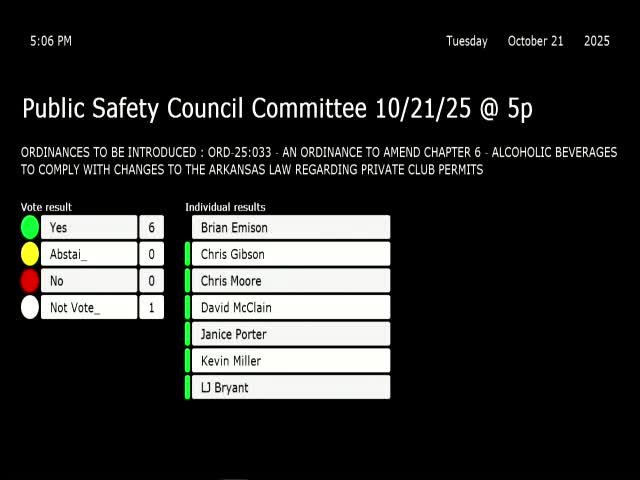Jonesboro committee tables ordinance requiring third-party inspections for passive fire protection
Get AI-powered insights, summaries, and transcripts
Subscribe
Summary
The Jonesboro Public Safety Committee voted to table Ordinance 25036, which would have required third-party inspections of passive fire protection work on architect-designed projects, after staff explanation and public comments raised questions about local capacity and scope.
The Jonesboro Public Safety Committee voted to table Ordinance 25036 indefinitely after discussion and public comment. The ordinance would have required owners or owners’ agents to retain third-party inspectors to verify passive fire protection systems when those systems were used as part of an architect’s design.
The ordinance text presented to the committee said the third-party inspector would be required “anytime passive fire protection is used by an architect as part of their design” and that the inspector must examine components listed in the most current edition of the Arkansas Fire Prevention Code. The measure was introduced as an attempt to formalize a practice staff said is already occurring informally on some projects.
Committee members and staff said the requirement was aimed at making inspections consistent and thorough. Greg (staff member), who helped draft the ordinance, told the committee that developers sometimes hire third-party inspectors now but that because it is not mandated the work has been “a bit arbitrary.” He said the ordinance was intended to “make it more consistent across the board” because, he said, “without the third party, the inspections are not being done, as thorough as they should be.”
Staff and committee members clarified the scope of existing city inspections. Greg said the fire marshal’s office would continue to inspect sprinkler and hood-suppression systems, while passive fire protection — items such as fire corridors, fire doors, fire-rated walls and the seals around penetrations — is more technical and time-consuming to inspect. Under the proposed ordinance, builders choosing passive methods instead of sprinklers would have been required to hire and pay for an approved third-party inspector; the city would review and approve the inspector’s credentials.
Residents and local designers who spoke at the meeting urged caution. Carol Caldwell, who gave her name and address for the record, said she worried the requirement would force Jonesboro residents and developers to bring in consultants from other cities. “I don’t wanna call somebody from Memphis to get a CO,” she said, adding that she did not know whom to call locally or how to estimate the cost. Local architect Matt Silas said he supported safety but asked for more discussion with local design professionals. “I would propose tabling this vote until maybe we could have more discussion with local architects and the city,” he said.
Committee members moved to postpone the ordinance indefinitely. The motion to table carried on a roll call: Miller — No; Bryant — Aye; McClain — No; Gibson — Aye; Moore — Aye; Porter — Aye. The chair announced the item was tabled indefinitely (Ordinance 25036).
With the motion to table, committee members and attendees left unresolved several implementation questions: whether the city should maintain a preferred-vendor list, what minimum credentials would be required of third-party inspectors, and a typical fee range for inspections. Staff said developers would be responsible for securing the inspector but that the city would approve qualifications.
The item will not proceed to the full council unless reintroduced in a future form. For now, the city’s practice of developers sometimes hiring third-party inspectors will remain informal rather than mandatory.
